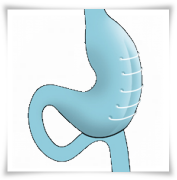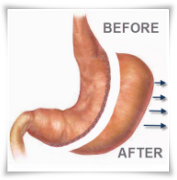Gastric Sleeve Surgery Risks
Every surgery carries dangers, and if you are thinking of a gastric sleeve, you should be aware of the gastric sleeve surgery risks that are present both during and after surgery. For those patients who have undergone the gastric sleeve surgery, the risk for complications is at its highest in the days immediately following the surgery.
The first 10 days are considered to be the most critical, but after those days had passed, the danger of gastric sleeve surgery risks and complications to arise will drop substantially.
Click here to learn more about the Downsides to Gastric Sleeve Surgery.
Gastric Sleeve Surgery Risks – A Brief Rundown
In short, the gastric sleeve surgery risks you should be aware of can include (but are not limited to):
- Gallstones
- Internal Bleeding
- Blood Clots
- Stomach Leakage
Gastric Sleeve Surgery Risks
Here is a more detailed rundown of the gastric sleeve surgery risks that you may encounter.
Gallstones
Any rapid weight loss, even from the gastric sleeve surgery, increases the risk of developing gallstones. The occurrence of having these gallstones had been estimated to be about 12% when you are on a low calorie diet or after undergoing a bariatric procedure, but it is one of the gastric sleeve surgery risks that can occur.
Internal Bleeding
Internal bleeding is one of the gastric sleeve surgeyr risks. You should also be aware that you may bleed through the rectum as this is a common side effect. Blood may get into the stomach during surgery, and it will exit the body through the rectum. Rectal bleeding will help to determine if a complication exists. Should the patient start to bleed, it will usually occur within the first 24 – 36 hours, this is why it is very important that you remain under supervised care to monitor for any symptoms during the initial recovery period.
Symptoms of internal bleeding include:
- Shortness of breath (difficulty of breathing)
- Pale skin tone, gray skin tone
- Dizziness when walking
- Increased heart rate
- Unable to urinate
Blood Clots
The formation of blood clots is rare, but it is one of the potential gastric sleeve surgery risks, however it occurs in less than 1% of the gastric sleeve patients. A blood clot posses a big risk for the obese patients who are undergoing this type of bariatric surgery. A blood clot that breaks into the blood stream can be very life threatening or even fatal. That is why a blood thinner will be prescribed before the surgery and specially designed leg fittings are frequently used during the surgery. Early ambulation is also advised. To avoid blood clots from forming, it is a good idea to get out of bed and walk around a few times a day to keep the blood circulating properly, and avoid this as it is one of the more serious gastric sleeve surgery risks.
Stomach Leaking after the Gastric Sleeve
Stomach leakage is another one of the potential gastric sleeve surgery risks. A serious infection may be the consequence should a hole develop along the seam where the stomach has been stapled. It is rare for the staples to become undone, and leakage to occur, but it is one of the potential gastric sleeve surgery risks nonetheless. Acids from your stomach can seep into the abdominal cavity, and that can negatively affect the other neighboring organs. This condition is known as sepsis, and is one of the more uncomfortable gastric sleeve surgery risks.
 Symptoms of stomach leakage include:
Symptoms of stomach leakage include:
- High fever with no apparent reason
- Rapid shallow breathing
- Shortness of breath
- Abdominal pain
- Feeling of weakness
- Abdominal swelling
Gastric surgery sleeve risks, although low, can still be life threatening. Stomach leakage is considered an acute complication because it can be difficult for the surgeon to tell if there is indeed a leak. At present, there is no guaranteed test that is available to determine if there is a leak. Should the surgeon suspect a presence of a leak, the patient will be immediately brought back to the hospital for another surgery to correct this and check for any other gastric sleeve surgery risks.
It is important that you speak with you bariatric surgeon to find out all the gastric sleeve surgery risks. Even though the risks are minimal, they do exist, and you should be aware of them. Gastric sleeve patients are strongly advised to seek prompt medical attention if something does not feel right because you know your body better than anyone else. Inform your doctor immediately or get to the nearest hospital if you feel that something is not right, or are experiencing any symptoms of the mentioned gastric sleeve surgery risks.

